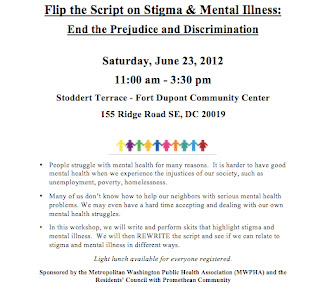When someone says the word "theater," what comes to your mind? Entertainment? An escape from reality? An unfolding story that, no matter how intriguing it may be, you can only watch?
Though theater played a key role in the MWPHA workshop held on June 23, the event was about as far from a passive, reality-eschewing experience as it could possibly be…though it was entertaining at times!
Entitled “Flip the Script on Stigma and Mental Illness: End
the Prejudice and Discrimination,” the workshop was a collaboration between the
MWPHA and two other organizations: Promethean Community, which utilizes theater
techniques to help community members find new ways to relate to each other, and
the Stoddert Terrace–Fort Dupont Residents’ Council, which is composed of representatives
from two public housing complexes in the District and focuses on residents’
rights and collective well-being. The workshop was held at the complexes’
shared community center.
The event opened with a greeting from Kenneth Council,
president of the Residents’ Council, followed by remarks from Andres
Marquez-Lara, founder and president of Promethean Community. Kenneth welcomed
the community members and public health workers alike who had showed up that
morning, and Andres described the rules and the agenda of the workshop, which
were heavily influenced by “theater of the oppressed” (TO).
Originally developed by theater practitioner Augusto Boal
and based on the research of educator Paulo Freire, theater of the oppressed lets
members of a community use theater as a way to promote social action and change.
While there are various techniques within TO, the June 23 workshop was inspired by
forum theater, a technique where a performance that depicts an
oppressive situation is performed in front of an audience, called
“spect-actors”. After the first performance, the scene is performed again, but
this time the scene can be changed by the spect-actors. If they choose not to
change the performance, the scene goes to its natural tragic ending. If they
choose to change it, all they have to do is yell “Stop!” and suggest a new
course of action for the protagonist, or insert a supportive element in the
scene. The spect-actors cannot do away with the oppressive elements, but they
can help the protagonist navigate them. The proposed changes must be realistic.
To get comfortable with each other and to mentally prepare
for the day ahead, participants took part in a series of icebreakers. First, Andres
had everyone pair up and play Rock, Paper, Scissors. Whoever won the best two
out of three in each pair went on to challenge the winner of another pair, as
would be expected. However, in a twist, the loser of each pair was to become
“the biggest fan of the winner,” and they would follow the winner of their
individual pair as his or her cheerleader. By the end of the icebreaker, there
were only two competitors and a room full of fans divided evenly among the two.
After the final victor was declared, everyone was united in cheering for the
one winner; her success was shared by everyone.
Other icebreakers were more directly involved with stigma
and mental illness. Andres had workshop participants line up along an imaginary
spectrum gauging their comfort with public speaking, talking about mental
illness, and willingness and confidence to interject when they observe
discrimination and prejudice. Everyone placed themselves on different points of
the spectrum depending on the question; no one was equally comfortable or
uncomfortable with every situation mentioned. This allowed participants to see
their relationship to others in the criteria that was being used.
The last icebreaker was especially introspective.
Participants were encouraged to walk around the room in silence at whatever
pace and in whatever direction appealed to them, and to think about how they
thought about others in the room. They were then asked to consider the labels
they assign to themselves, how they feel about those labels, which labels they
want to keep, and which ones they want to cast away; to think of the labels
they placed on the other participants in the room, and be mindful of their
response to the labels they observed in others. Afterwards, everyone broke into
threes to talk about thoughts that came to mind, sharing as much or as little
as they were willing to.
Then, it was finally time to get to the scenes. Workshop
participants were split into smaller groups based on birth month. Each group
had one or two volunteer facilitators, who had met beforehand with Andres in
three previous training sessions. The facilitators got the small groups
comfortable with one another through an introduction warm-up, then each group
got started coming up with a situation and characters for their five-minute skit,
which would depict someone with a mental illness who encounters a problem
because of stigma or prejudice. Once the group had a story and characters, they
rehearsed until they felt it was ready to be performed in public.
Lunch time: over sandwiches and snacks, participants had
time to relax and get to know each other better. After lunch, the room was reconfigured
into an audience and floor space for the stage, and Andres asked which group
wanted to perform first. Hands in the audience shot up eagerly.
Check back tomorrow evening to find out how the remainder of the workshop went!

No comments:
Post a Comment